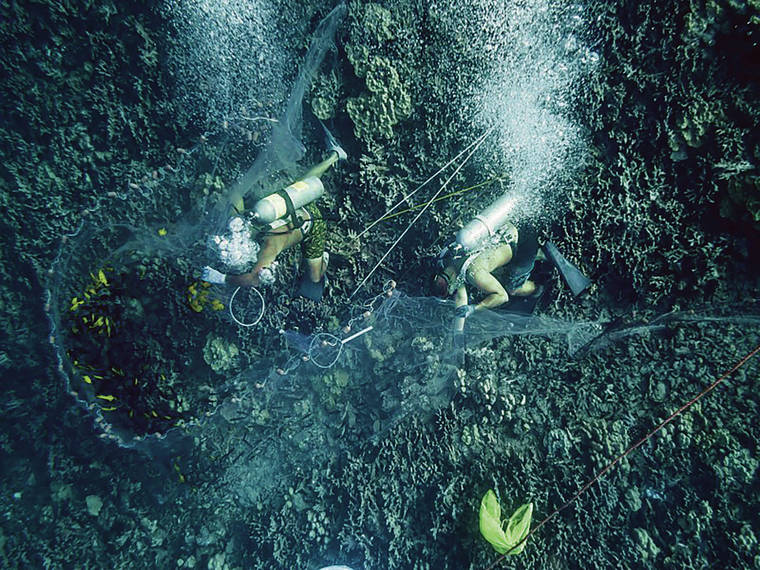Earthjustice filed suit Monday against a state agency it says is sidestepping the law when it comes to the regulation of tropical fish taken from Hawaii’s reefs for the commercial aquarium pet trade.
After sending a letter earlier this month to the state Department of Land and Natural Resources with these allegations, and getting no response to a request for a meeting, Earthjustice filed the suit Opens in a new tab in state Circuit Court.
“We’re going to court today to safeguard Hawaii’s treasured marine life against an absentee agency that insists on giving the aquarium industry free rein to strip our reefs and export our marine life to mainland hobbyists,” said Earthjustice attorney Mahesh Cleveland in a news release. “Half a million marine animals in two years is devastating for our reefs, and just scandalous in light of the courts’ instructions to halt aquarium collection until the agency and industry fully come to grips with the environmental impacts of what they’re doing.”
The suit’s plaintiffs include Native Hawaiian cultural practitioners
Willie and Ka‘imi Kaupiko, Mike Nakachi and nonprofits For the Fishes and the Center
for Biological Diversity. DLNR is named as the
defendant.
In September 2017 the Hawaii Supreme Court made a landmark ruling Opens in a new tab, the suit said that commercial aquarium collection permits should be subject to environmental review requirements under the Hawaii Environmental Policy Act. A state Circuit Court subsequently voided all permits and placed a moratorium on all commercial aquarium permits until environmental reviews were completed.
Earthjustice alleges that DLNR instead “created a loophole” by issuing commercial marine licenses and allowed for the collection of aquarium fish, as long as no fine-meshed nets or traps were used.
DLNR previously required both the aquarium permit and marine license, but began accepting only the latter after the ruling. Since 2017 it has issued or renewed at least 72 commercial marine licenses to aquarium collectors, the suit said. Additionally, DLNR is not actively verifying self-reported methods of collection.
Using the loophole, Earthjustice estimated commercial collectors have taken at least 576,741 individual animals — 372,769 fish and 203,972 aquatic invertebrates — from Hawaii’s surrounding ocean for aquarium purposes over the last two years, based on self-reported catch data.
“Fish extraction at these levels would be extraordinarily difficult or impossible without fine-meshed gear,” the suit said.
DLNR’s Division of Aquatic Resources maintained, however, that it has been following the law.
“Under current law, commercial aquarium fishing is allowed as long as collectors have a valid commercial marine license and are using legal gear and methods,” said DLNR in a statement. “This is applicable for all areas except West Hawaii, where all aquarium collection is prohibited until an environmental review is completed.”
“We respect Earthjustice’s right to pursue this matter in court if it believes that is the right thing to do,” DLNR continued. “We have not seen the lawsuit and cannot comment on its substance.”
Sales of aquarium fish have brought in more than $1 million from 2018 to 2019, according to catch data reports, while the industry itself has estimated the trade brings in an annual average of at least
$2.6 million.
The suit said this unregulated activity threatens the livelihood of Native Hawaiian practitioners like Willie Kaupiko, a resident of Milolii, who is alarmed by the “large numbers of immature fish removed from the reef by such practices.” That severely reduces reproductive opportunities for the remaining fish populations, the suit said.
In Kaupiko’s cultural practice, one takes only what one needs to feed one’s family, leaving the rest to replenish itself.
He has also observed firsthand declining numbers of fish on the reefs, particularly the Achilles tang (pakuikui) and goldring surgeonfish (kole),
as well as a decline in reef health in areas open to aquarium collection over the decades.
Rene Umberger, executive director of For the Fishes on Maui, said the group was shocked to learn the industry has “continued ravaging Hawai‘i’s reefs without any assessment
of environmental harm, despite the courts’ rulings” under DLNR’s watch.
The nonprofit, through an app, Tank Watch Opens in a new tab, encourages consumers to purchase captive-bred rather than wild-caught fish from Hawaii’s reefs for their
saltwater aquariums.
Aquarium fish are mostly herbivores, the suit said, and play a vital role in controlling algae growth in the coral reef ecosystem.

